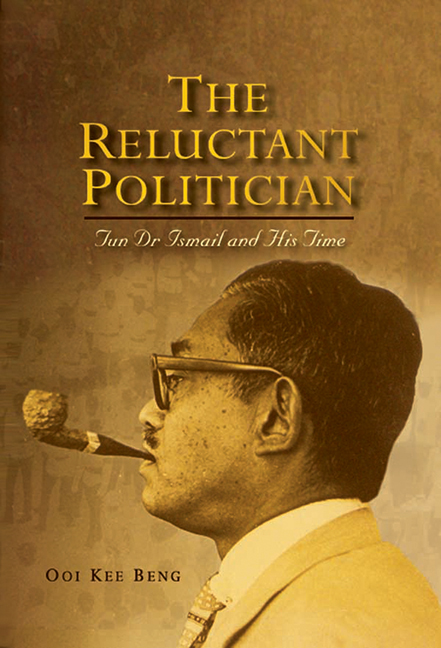Book contents
- Frontmatter
- Contents
- Foreword
- MESSAGE FROM THE DIRECTOR
- PREFACE
- Acknowledgements
- About the Author
- Chronology
- PART ONE Merdeka or Medicine?
- Chapter One The Acting Prime Minister Dies
- Chapter Two Life before Politics
- Chapter Three UMNO and the Road to Merdeka
- Chapter Four Positioning Malaya in the World
- Chapter Five The Making and Partitioning of Malaysia
- PART TWO Remaking Malaysia
- List of Abbreviations
- Bibliography
- Index
- Photographs
Chapter Four - Positioning Malaya in the World
from PART ONE - Merdeka or Medicine?
Published online by Cambridge University Press: 21 October 2015
- Frontmatter
- Contents
- Foreword
- MESSAGE FROM THE DIRECTOR
- PREFACE
- Acknowledgements
- About the Author
- Chronology
- PART ONE Merdeka or Medicine?
- Chapter One The Acting Prime Minister Dies
- Chapter Two Life before Politics
- Chapter Three UMNO and the Road to Merdeka
- Chapter Four Positioning Malaya in the World
- Chapter Five The Making and Partitioning of Malaysia
- PART TWO Remaking Malaysia
- List of Abbreviations
- Bibliography
- Index
- Photographs
Summary
Shortly before Independence Day, the Tunku asked Ismail to become Malaya's first ambassador to the United States of America. He also wished him to double as Malaya's first permanent representative to the United Nations. It was thought important for Malaya to cultivate strong ties with the major power in the world. The United States furthermore represented “modern capitalism” in which Malaya's leaders placed their trust, in contradistinction to the purportedly “old capitalism” that had colonized the region. Ismail agreed to go, but only if it was for a year.
The choice, the Tunku told him, was between Razak and him, and frankly, Razak was badly needed as his deputy. Ismail's friends and relatives were appalled and saw the posting as a silently executed banishment. That thought did not seem to have crossed his own mind, however, and he actually felt satisfaction at being offered a position through which he could work at making “our newly independent country […] known abroad”.
As is usual with me, when I took on the assignment I threw my heart and soul into the job. It was a tough assignment and not made any easier by the lack of prior government preparation. In fact, I had to set up the two missions from scratch (Drifting c13).
Ismail left on 15 July 1957 for the United States to acquire accommodation for the Washington embassy as well as the New York mission. He managed to purchase three buildings in Washington “to conform to our status” and also to secure a lease for an office in New York. Rushing through the chores of the trip, he thought it fortunate that he was now acting as a cabinet minister with the right to negotiate, and could therefore close deals quickly.
He was nevertheless surprised on his return on 21 August to Kuala Lumpur to discover that the cabinet had approved the acquisition of only two buildings. Since the cabinet happened to be meeting the same afternoon that he arrived, Ismail hastily rushed over to the sitting and managed to gain approval for the third building. Ismail would gripe over the fact that certain members of the cabinet had thought his purchases excessively expensive, especially when he was aware of how much higher sums other countries were then spending on their new American embassies.
- Type
- Chapter
- Information
- The Reluctant PoliticianTun Dr Ismail and His Time, pp. 86 - 136Publisher: ISEAS–Yusof Ishak InstitutePrint publication year: 2007



